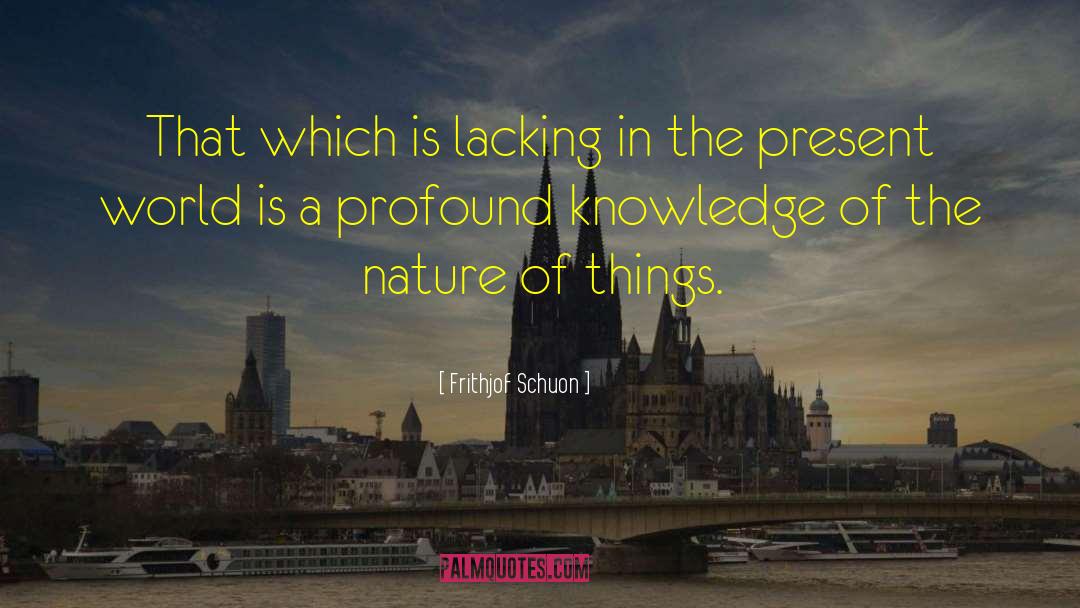Frithjof Schuon Famous Quotes
Reading Frithjof Schuon quotes, download and share images of famous quotes by Frithjof Schuon. Righ click to see or save pictures of Frithjof Schuon quotes that you can use as your wallpaper for free.
When people want to be rid of Heaven it is logical to start by creating an atmosphere in which spiritual things appear out of place; in order to be able to declare successfully that God is unreal they have to construct around man a false reality, a reality that is inevitably inhuman because only the inhuman can exclude God. What is involved is a falsification of the imagination and so its destruction.
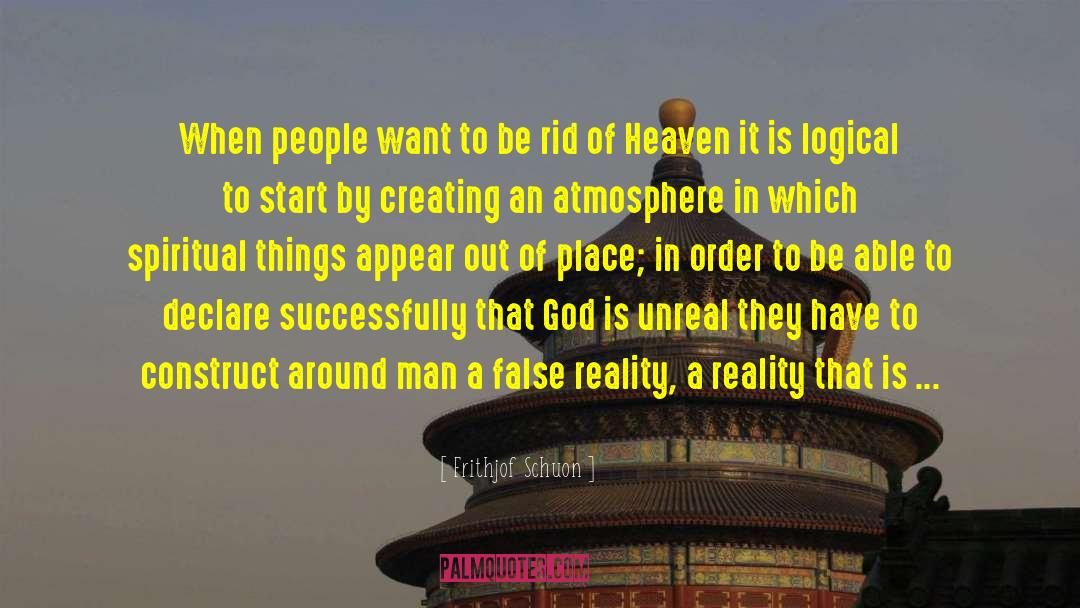
Certainly truths are to be found in all the philosophers, and above all half-truths, but these truths are flanked with errors and inconsistencies, and there is moreover no need for them; hence it is pointless to dwell on them. Partial truths are only to be accepted in the domain of traditional orthodoxy, because they are only acceptable in the context of the total Truth, which alone guarantees their exactitude and their efficacy. To think while denying the total Truth, which is both objective and subjective, is completely inconsistent; it is not really thinking.
[Letter on Existentialism to Huston Smith]
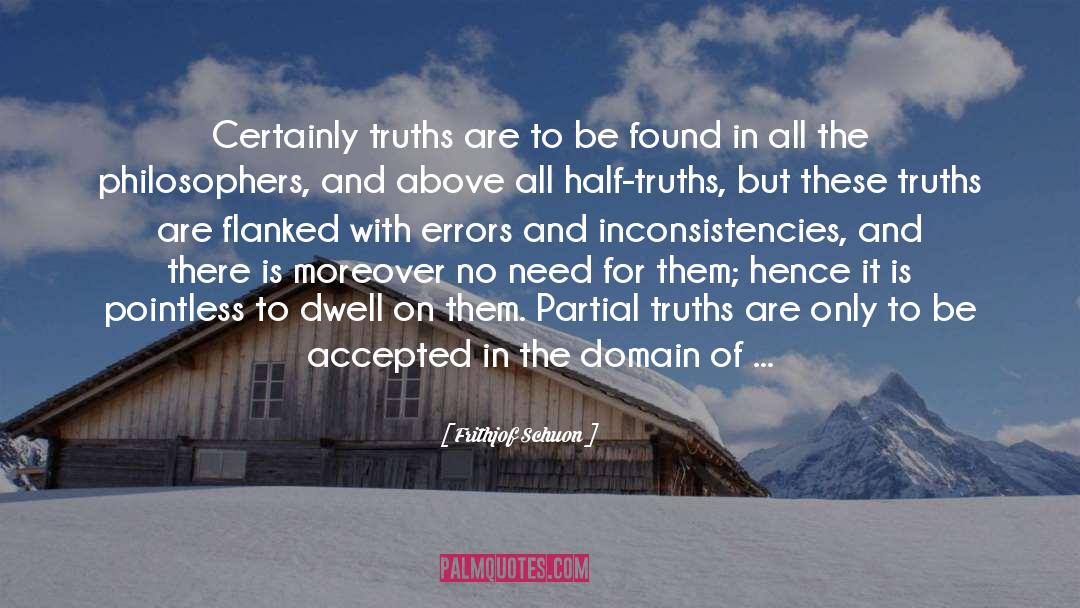
[...] one may ask why so much stupidity and bad faith are to be found in religious polemics, even among men who are otherwise free from such failings...No blame can be attached to a person for attacking a foreign religion in the name of his own belief, if it is done purely and simply through ignorance; when, however, this is not the case, the person will be guilty of blasphemy, since, by outraging the Divine Truth in an alien form, he is merely profiting by an opportunity to offend God without having to trouble his own conscience. This is the real explanation of the gross and impure zeal displayed by those who, in the name of their religious convictions, devote their lives to making sacred things appear odious, a task they can only accomplish by contemptible methods.
![Frithjof Schuon Quotes: [...] one may ask why Frithjof Schuon Quotes: [...] one may ask why](https://palmquotes.com/author/frithjof-schuon-quotes-910721.jpg)
The mentality of today seeks in fact to reduce everything to temporal categories: a work of art, a thought, a truth have no value in themselves and independently of any historical classification, but only as a result of the time in which they are rightly or wrongly placed; everything is considered the expression of a "period", not of a timeless and intrinsic value, and this is entirely in conformity with modern relativism and with a psychologism or biologism that destroys essential values . This philosophy derives a maximum of originality from what in effect is nothing but a hatred of God; but since it is impossible to abuse directly a God in whom one does not believe, one abuses Him indirectly through the laws of nature , and one goes so far as to disparage the very form of man and his intelligence, the intelligence with which one thinks and abuses. But there is no escaping immanent Truth: "The more he blasphemes," says Meister Eckhart, "the more he praises God.
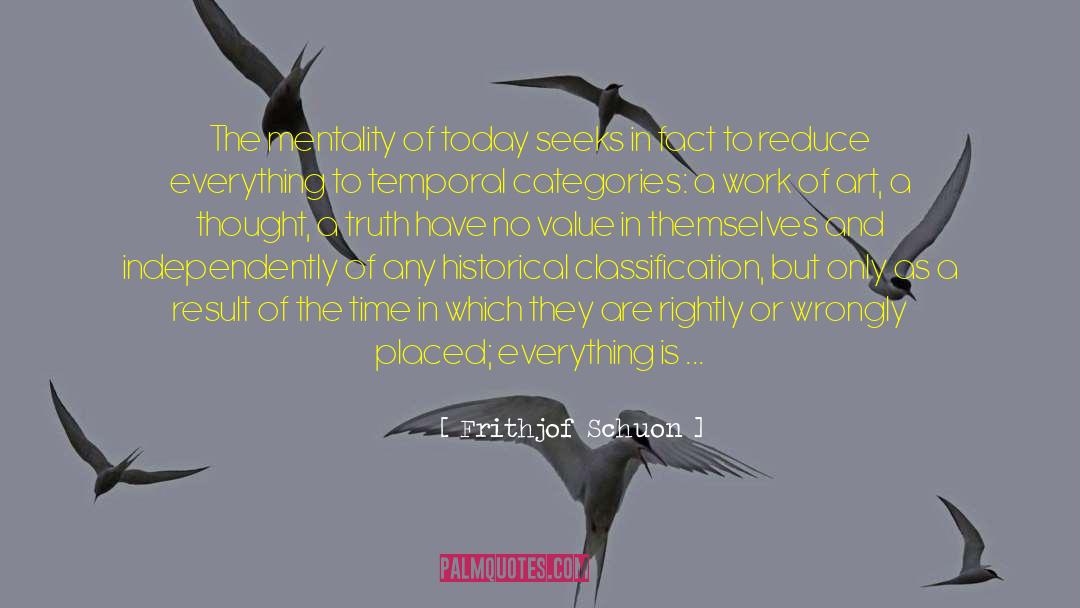
The truth is, however, that every religion form is superior to the others in a particular respect, and it is this characteristic that in fact indicates the sufficient reason for the existence of that form.
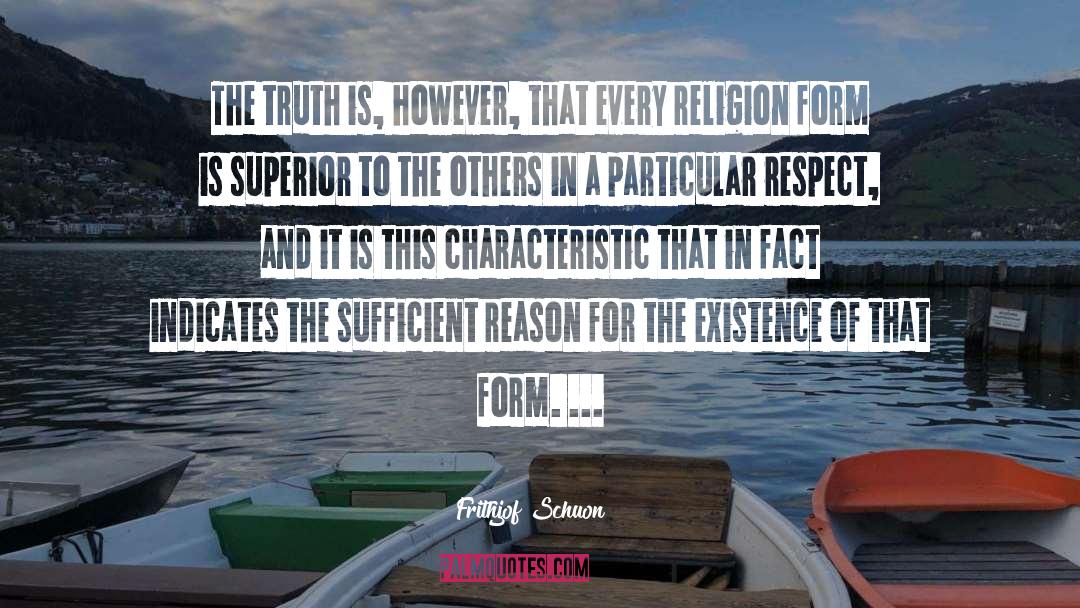
Man is made of thought, of will and of love: he can think truth or error, he can will good or evil, he can love beauty or ugliness. Now thought of the true - or knowledge of the real - demands on the one hand willing of the good and on the other love of the beautiful, hence virtue, for virtue is none other than beauty of soul; that is why the Greeks, who were aesthetes as well as thinkers, included virtue within philosophy. Without beauty of soul, all willing is sterile, it is petty and closes itself to grace; and in an analogous manner: without effort of will, all spiritual thought ultimately remains superficial and ineffectual and leads to pretension. Virtue coincides with a sensibility proportioned - or conformed - to the Truth, and that is why the soul of the sage soars above things and thereby above itself, if one may put it thus; whence the disinterestedness, nobleness and generosity of great souls. Quite clearly, the consciousness of metaphysical principles cannot go hand in hand with moral pettiness, such as ambition and hypocrisy : "Be ye perfect even as your Father in Heaven is perfect.

Certainly, all esoterism appears to be tinged with heresy from the point of view of the corresponding exoterism, but this obviously does not disqualify it if it is intrinsically orthodox, and thus in conformity with truth as such and with the traditional symbolism to which it pertains; it is true that the most authentic esoterism can incidentally depart from this framework and refer to foreign symbolisms, but it cannot be syncretistic in its very substance.
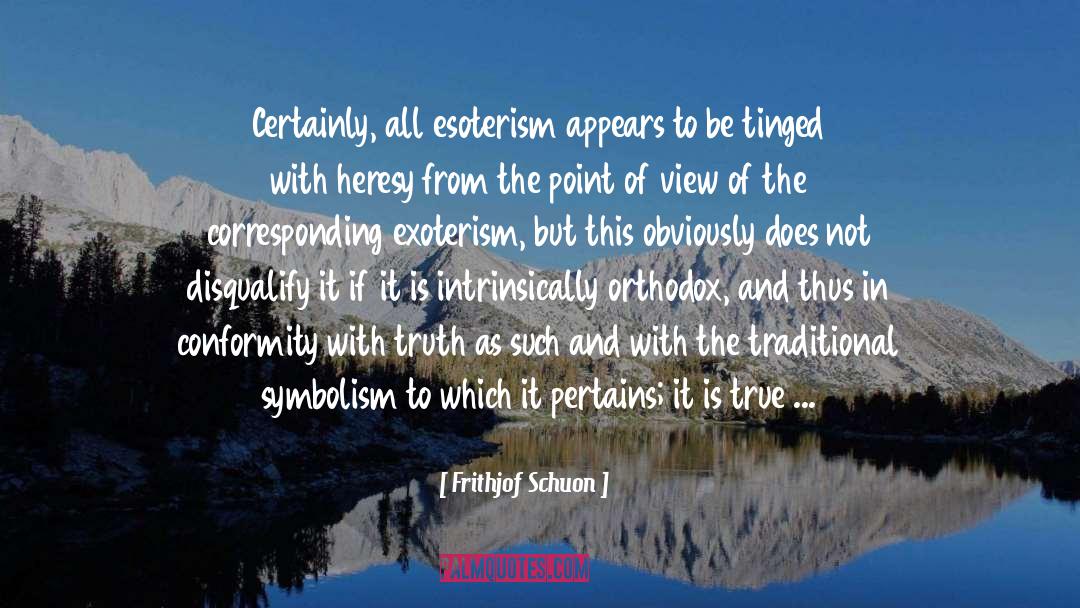
The heliocentric system is not exclusively modern; I will not be telling you anything new in recalling here that Aristarchus of Samos and Hipparcus - and later al-Battani - taught it; nonetheless one understands why the ancients finally preferred the geocentric system: this system corresponds to immediate experience, hence to sacred symbolisms, whereas the opposite system is beyond most men's capacity for assimilation and entails serious dangers - it "troubles the repose of the Gods", as the opponents of Aristarchus said - which does not mean it is astronomically incorrect. In any case, pushing scientific curiosity too far - to the detriment of contemplation and the inward knowledge of appearances - is imprudence and Luciferianism, and it is partly for this reason that the ancients instinctively retained the geocentric doctrine.
It goes without saying that the knowledge of realities that are normally unknown and contrary to current experience is a matter of indifference from the point of view of pure intellectuality and esoterism; if I bring it up here, it is simply because the context more or less requires it.
Extract from a letter - 22 June 1964.
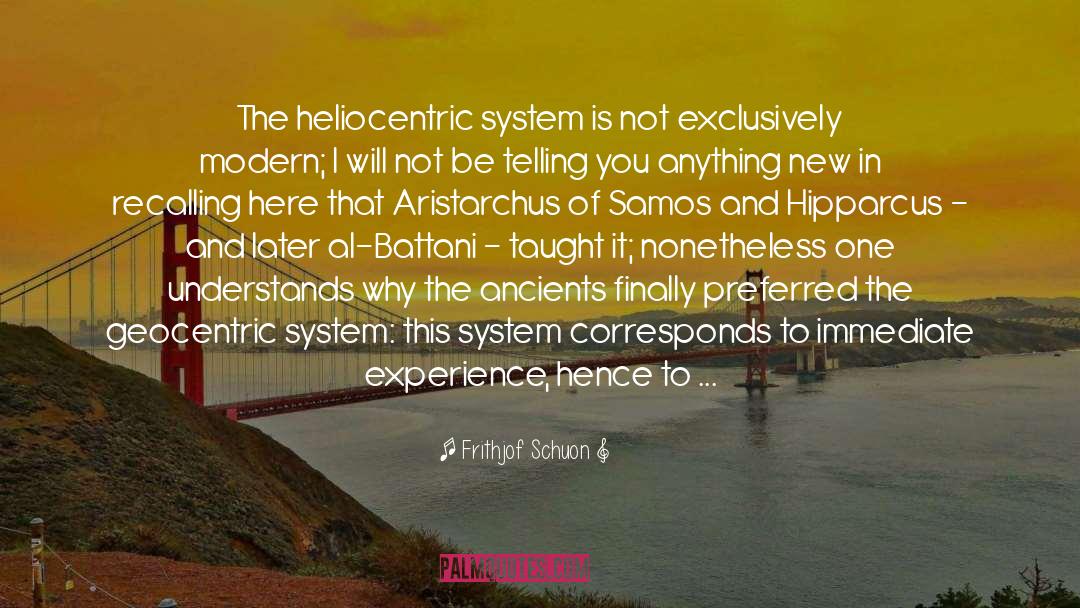
A man may have metaphysical certainty without having "faith", that is, without this certainty residing in his soul as a continuously active presence. But if metaphysical certainty suffices on doctrinal grounds, it is far from being sufficient on the spiritual plane where it must be completed and brought to life by faith. Faith is nothing other than the adherence of our whole being to Truth, whether we have a direct intuition of this Truth or an indirect notion. It is a misuse of language to reduce "faith" to "belief"; it is the opposite that is true: belief--or theoretical knowledge--must be changed into the faith "that moves mountains". For the Apostles there was no difference in practice between an idea and its spiritual validation; they did not separate theory from realization, hence the word "love" as a way of indicating all conformity to divine Truth.
He who has faith acts as if he were in the presence of what he believes--or knows--to be true. One can neither cast doubt on the fact that simple belief is already an adherence to Truth nor affirm that metaphysical certainty by itself implies an adherence of our whole being; for every man, whether he "knows" or "believes", perfection is "to worship God as if you saw Him, and if you do not see Him, He nonetheless sees you".
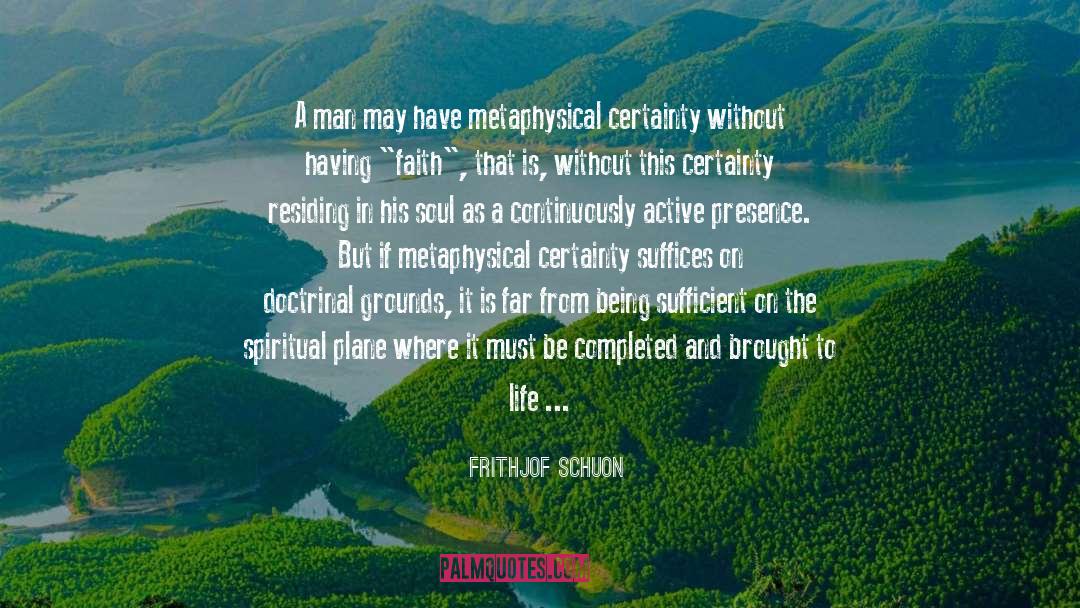
Agnostics and other relativists dispute the value of metaphysical certainty; in order to demonstrate the illusory character of the de jure certainty of truth, they set it in opposition to the de facto certitude of error, as if the psychological phenomenon of false certainties could prevent true certainties from being what they are and from having all their effectiveness, and as if the very existence of false certainties did not prove in its own way the existence of true ones. The fact that a lunatic feels certain he is something that he is not does not prevent us from being certain of what he is and what we ourselves are, and the fact that we are unable to prove to him that he is mistaken does not prevent us from being right; or again, the fact that an unbalanced person may possibly have misgivings about his condition does not oblige us to have them about our own, even if we find it impossible to prove to him that our certainty is well founded. It is absurd to demand absolute proofs of suprasensorial realities that one thinks one ought to question while refusing in the name of reason to consider metaphysical arguments that are sufficient in themselves; for outside of these arguments the only proof of hidden realities - as we have already said - is the realities themselves. One cannot ask the dawn to be the sun or a shadow to be the tree that casts it; the very existence of our intelligence proves the reality of the relationships of causality, relationships that allow us to ac
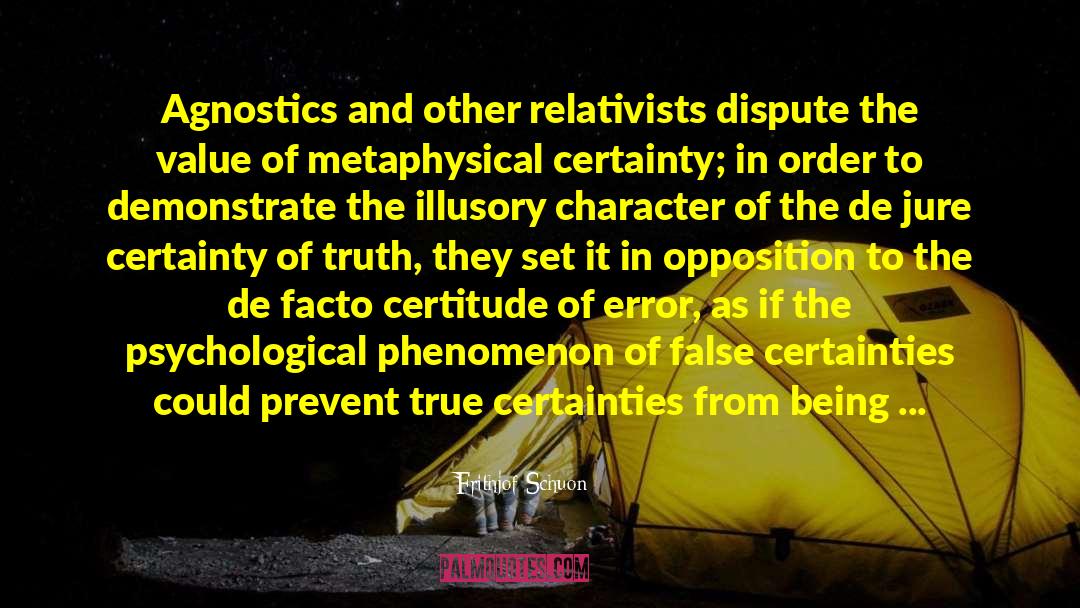
Tacitus laughed at the Germanic tribes who tried to stop a torrent with their shields, but it is no less naive to believe in planetary migration or to believe in the establishment by purely human means of a society fully satisfied and perfectly inoffensive and continuing to progress indefinitely. Al lthis proves that man ,thoough he has inevitably become less naive in some things, has nontheless learned nothing as far as essentials are concerned; the only thing that man is capable of when left to himself is to "commit the oldest sins the newest kind of ways," as Shakespeare would say. And the world being what it is, one is doubtless not guilty of a truism in adding that it is better to go to Heaven naively than to go intelligently to hell.
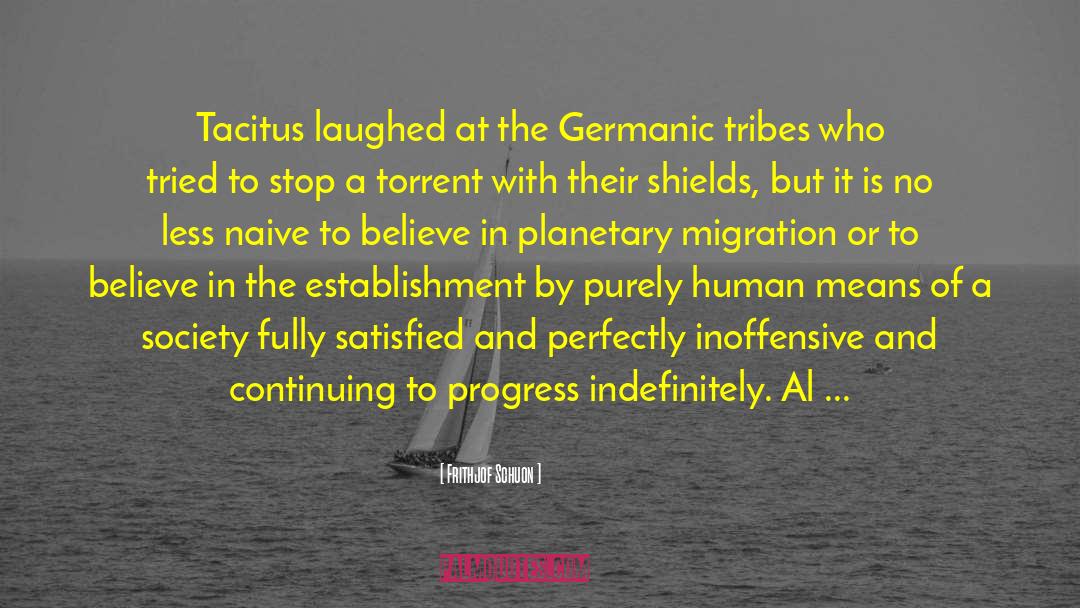
In order to discredit faith and seduce believers, Kant does not hesitate to appeal to pride or vanity: whoever does not rely on reason alone is a "minor" who refuses to "grow up"; if men allow themselves to be led by "authorities" instead of "thinking for themselves," it is solely through laziness and cowardice, neither more nor less. A thinker who needs to make use of such means - which on the whole are demagogic - must indeed be short of serious arguments.
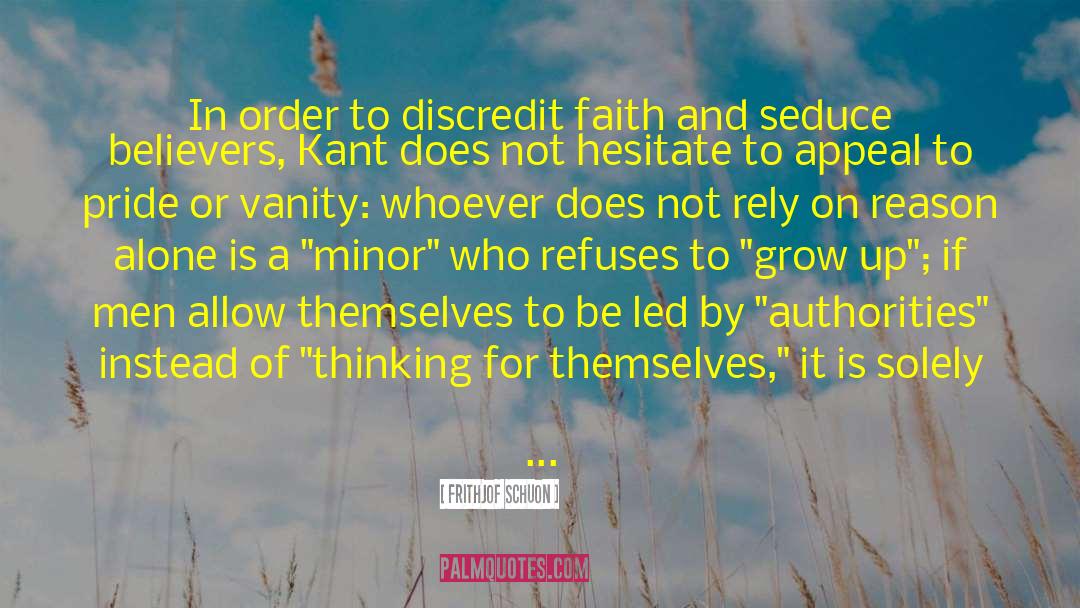
Nor is it in fact a purely human knowledge bound by the context and categories of the human mind. Rather, metaphysics, which some of his translators render as metaphysic in order to emphasize its non-multiple but unitary nature, is the science of Ultimate Reality, attainable through the intellect and not reason, of an essentially suprahuman character and including in its fullness the whole of man's being. It is a sacred science or scientia sacra, a wisdom which liberates and which requires not only certain mental capacities but also moral and spiritual qualifications. It
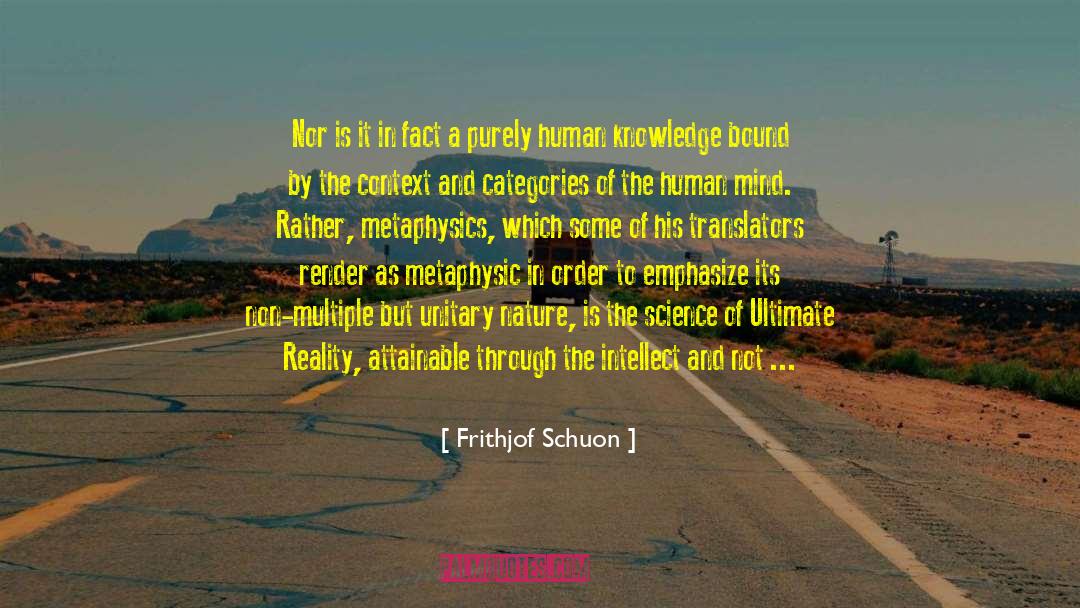
I am completely against ecumenism as it is envisaged today--with its ineffective "dialogues" and gratuitous and sentimental gestures amounting to nothing. Certainly an understanding between religions is possible and even necessary, though not on the dogmatic plane, but solely on the basis of common ideas and common interests. The common ideas are a transcendent, perfect, all-powerful, merciful Absolute, then a hereafter that is either good or bad depending on our merits or demerits; all the religions, including Buddhism--Buddhist "atheism" is simply a misunderstanding--are in agreement on these points. The common interests are a defense against materialism, atheism, perversion, subversion, and modernism in all its guises. I believe Pius XII once said that the wars between Christians and Muslims were but domestic quarrels compared to the present opposition between the world of the religions and that of militant materialism-atheism; he also said it was a consolation to know that there are millions of men who prostrate themselves five times a day before God.
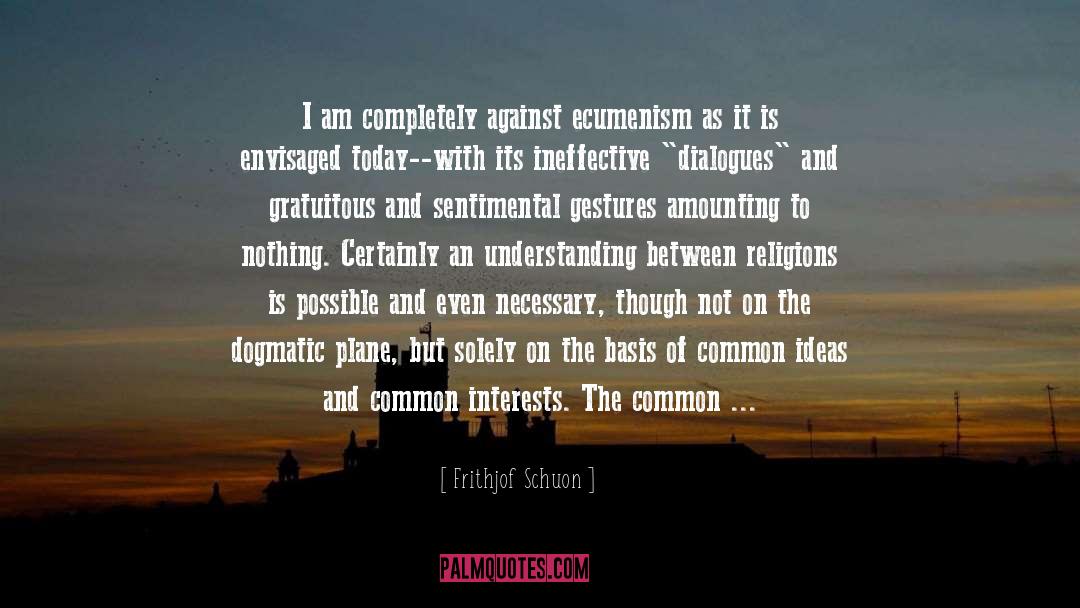
The esoteric finds the Absolute within the traditions, as poets find poetry within the poems.

It goes without saying that it is the traditionally minded Hindu we have in view, and not one whose hereditary dispositions have deviated in an anti-traditional direction, to the point of proving that "corruptio optimi pessima." Hinduism, strictly speaking, has no "dogmas" in the sense that every concept may be denied, on condition that the argument used is intrinsically true; which amounts to saying that concepts can be denied from the standpoint of a higher level of truth, metaphysics standing above cosmology and realization above theory as such. However, on their own level, the scriptural symbols of Hinduism are just as immovable as the Semitic dogmas, and this excludes any fallacious comparison of Hindu doctrine with the opinions of philosophers. No orthodox Hindu can maintain that the Veda has been mistaken on any point whatsoever.
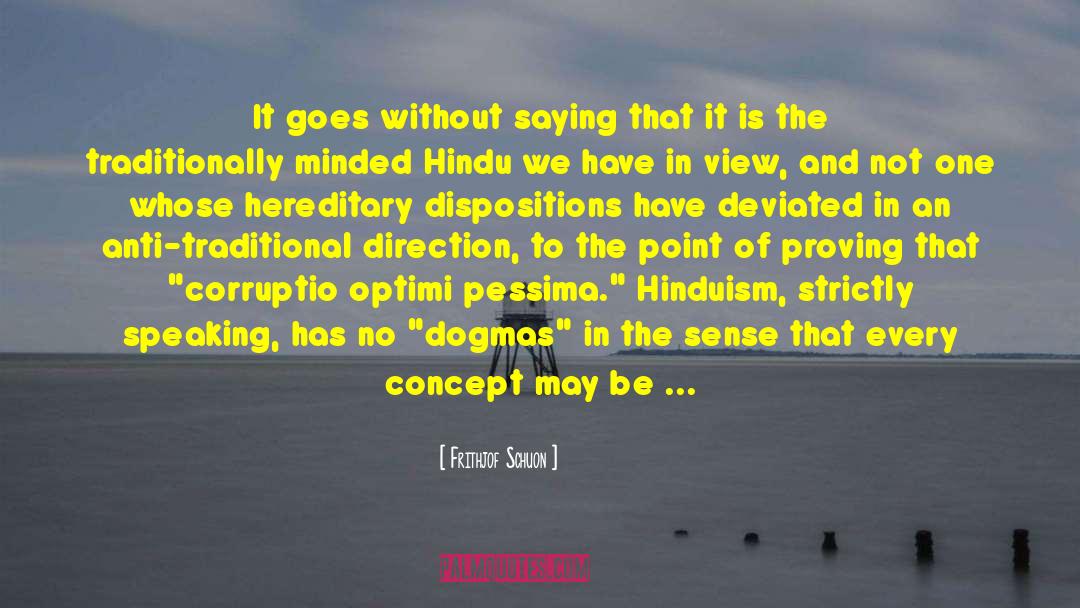
[ ... ] the sacred - that which is immutable, inviolable and thus infinitely majestic - is in the very substance of our spirit and of our existence. The world is miserable because men live beneath themselves; the error of modern man is that he wants to reform the world without having either the will or the power to reform man, and this flagrant contradiction, this attempt to make a better world on the basis of a worsened humanity, can only end in the very abolition of what is human, and consequently in the abolition of happiness too. Reforming man means bindinghim again to Heaven, reestablishing the broken link; it means tearing him away from the reign of the passions, from the cult of matter, quantity and cunning, and reintegrating him into the world of the spirit and serenity, we would even say: into the world of sufficient reason.
![Frithjof Schuon Quotes: [ ... ] the sacred Frithjof Schuon Quotes: [ ... ] the sacred](https://palmquotes.com/author/frithjof-schuon-quotes-169489.jpg)
Relativism reduces every element of absoluteness to relativity while making a completely illogical exception in favor of this reduction itself. Fundamentally it consists in propounding the claim that there is no truth as if this were truth or in declaring it to be absolutely true that there is nothing but the relatively true; one might just as well say that there is no language or write that there is no writing. In short, every idea is reduced to a relativity of some sort, whether psychological, historical, or social; but the assertion nullifies itself by the fact that it too presents itself as a psychological, historical, or social relativity. The assertion nullifies itself if it is true and by nullifying itself logically proves thereby that it is false; its initial absurdity lies in the implicit claim to be unique in escaping, as if by enchantment, from a relativity that is declared to be the only possibility.
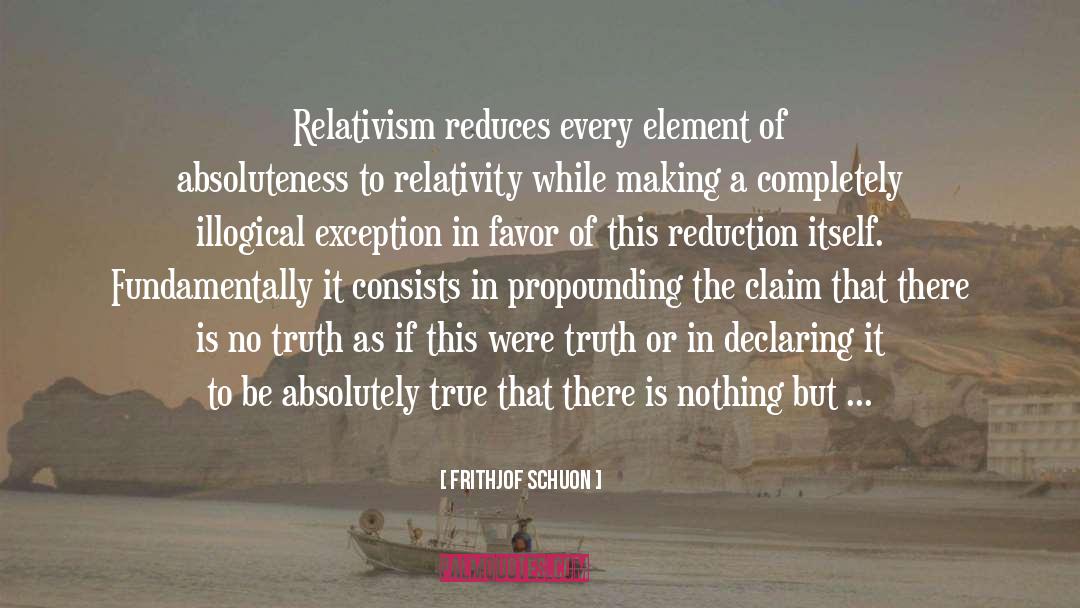
Essentially all religions include decisive truths and mediators and miracles, but the disposition of these elements, the play of their proportions, can vary according to the conditions of the revelation and of the human receptacles of the revelation.
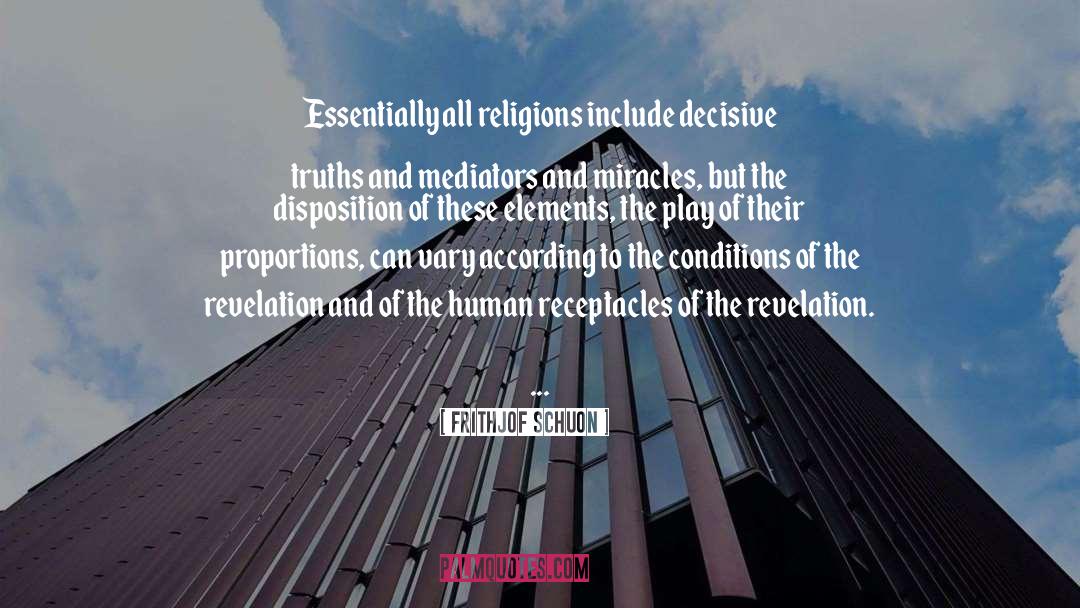
In relation to Monotheism considered as such, Judaism stabilized but "confiscated" the Message; Christianity universalized but "altered" it; Islam in turn restored it by stabilizing and universalizing it.
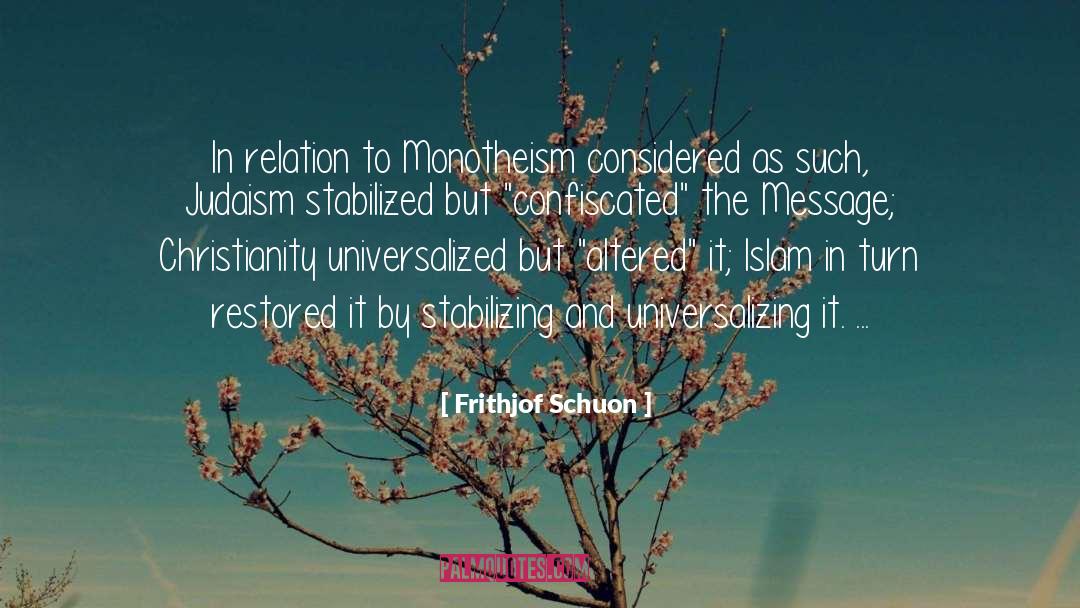
The following two examples bear witness to the same state of mind: a certain believer asks God for various favors not because he wishes to obtain them but "to obey the divine command" expressed in the Koran - as if in commanding or permitting personal prayer God was not considering the ends of this prayer and as if He could appreciate a form of obedience that disregarded the sufficient reason for the act commanded or permitted! In this case "command" is actually a rather grand word, for in reality God does not command us to have needs or make requests of Him but rather invites us out of mercy to ask Him for what we lack; we can pray for our daily bread or for a cure just as we can pray for inward graces, but there is no question of praying for the sake of praying because God ordered for the sake of ordering. The second example is the following: another believer, unlike the first, begins with the idea that everything is predestined, and he therefore abstains from formulating any prayers, in spite of the "divine command" this time, because "everything that must happen will happen anyway" - as if God would give Himself the trouble of commanding or permitting superfluous attitudes and as if prayer too were not predestined!
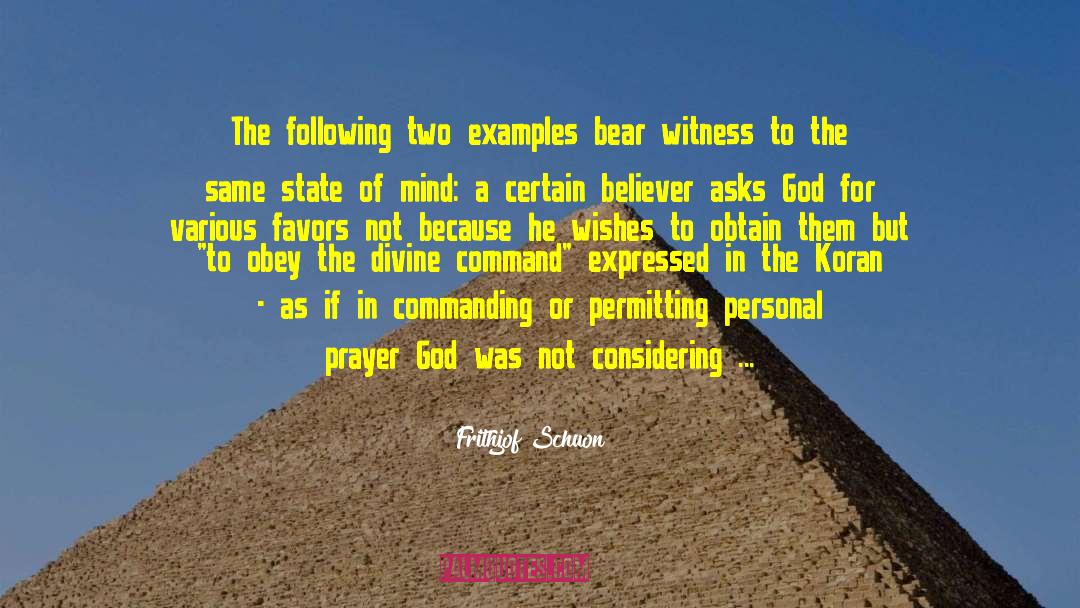
Modern science is only partially wrong on the plane of physical facts; on the other hand it is totally wrong on higher planes and in its principles. It is wrong in its negations and in the false principles derived from them, then in the erroneous hypotheses deduced from these principles, and finally in the monstrous effects this science produces as a result of its initial Prometheanism. But it is right about many physical data and even about some psychological facts, and indeed it is impossible for this not to be so, given the law of compensations; in other words it is impossible for modern men not to be right on certain points where ancient men were wrong; this is even part of the mechanism of degeneration. What is decisive in favor of the ancients or traditional men in general, however, is that they are right about all the spiritually essential points.
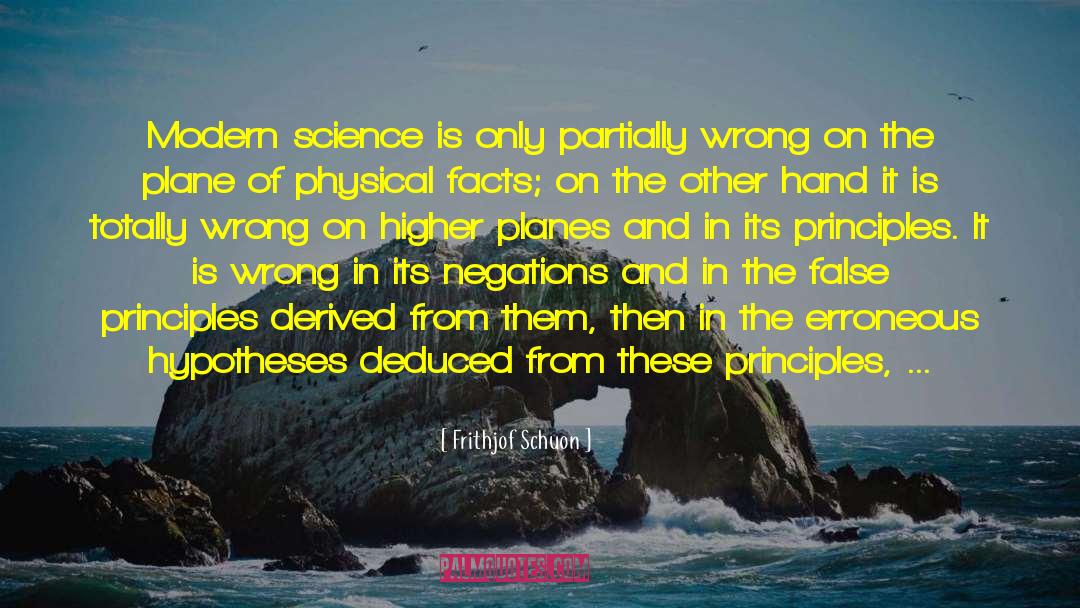
Knowledge does not abolish faith but gives it a more inward meaning. He who "knows" theoretically does indeed enjoy metaphysical certainty, but such certainty does not yet penetrate his whole being; it is as if, instead of believing a description, one saw the object described but without the sight of it implying either a detailed knowledge or a possession of the object, for a single visual perspective does not of course teach us the whole nature of the thing seen; thus there is certainty regarding the object as such in this case, but uncertainty regarding its integral nature. To "know" an object perfectly means to "possess" it, "become" it, "be" it; if the sight of an object is very much more than an abstract belief in its existence, the realization of the object will likewise be infinitely more than the sight of it; metaphysical certainty thus stands in a sense between belief--"faith" in the ordinary sense of the word--and the realization of union. As long as a man is not delivered from the chains of existence, there is always an element of "faith" in his "knowledge"; otherwise there would be nothing separating him from the Reality "known" or "to be known".
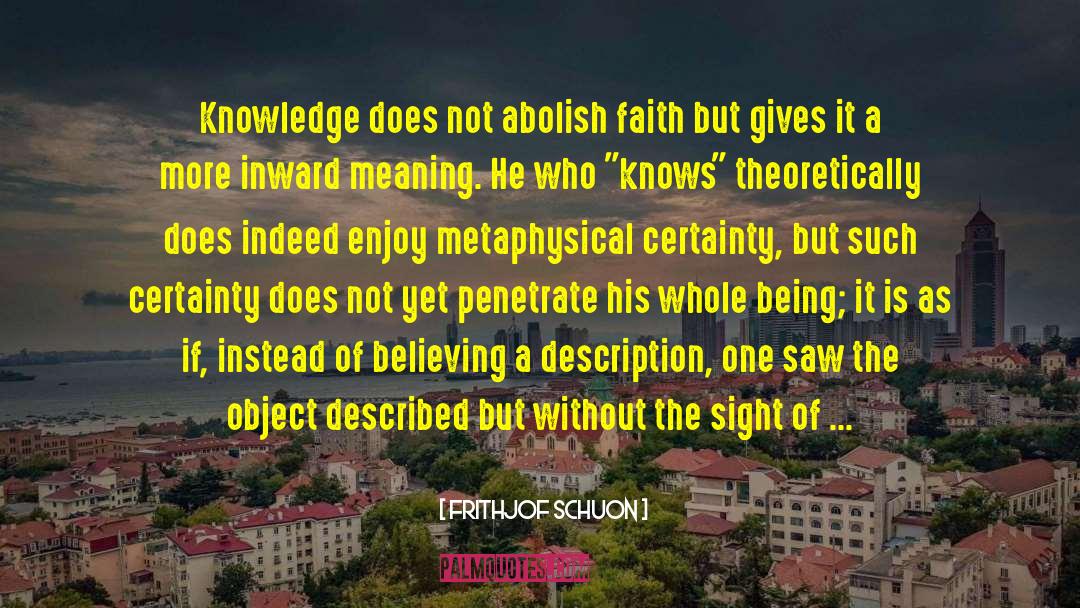
Beauty attached to God is sacrament, cut off from God it becomes an idol.

The real gnostic does not attribute any "state" to himself, for he is without ambition and without ostentation; he has a tendency rather
through an "instinct for holding back"
to disguise his nature inasmuch as he has, in any case, awareness of "cosmic play" (lila) and it is hard for him to take secular and worldly persons seriously, that is to say, "horizontal" beings who are full of self-confidence and who remain, "humanists" that they are, below the vocation of man
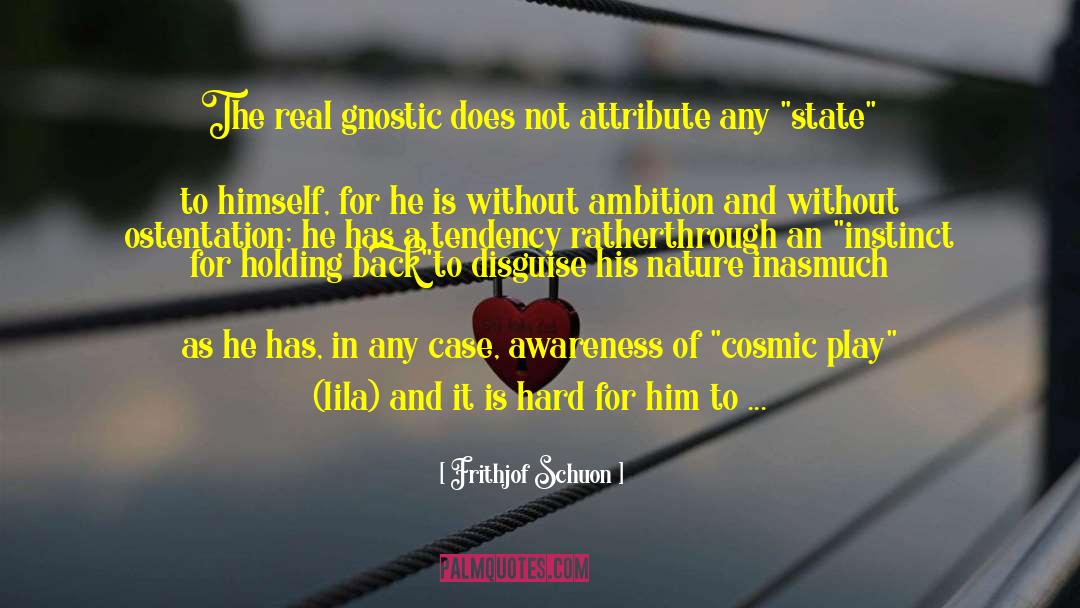
The distinction, in God, between a trans-ontological and transpersonal Essence on the one hand, and an already relative auto-determination on the other--this last is Being or the Person--marks the whole difference between the strictly metaphysical or sapiential perspective on the one hand and cataphatic and ontologistic theories in so far as they are explicit on the other. Let us remember at this point that the Intellect--which is precisely what makes evident to us the absoluteness of the Self and the relativity of 'objectivations'--is only 'human' to the extent that it is accessible to us, but it is not so in itself; it is essentially *increatus et increabile* (Eckhart), although 'accidentally' created by virtue of its reverberations in the macrocosm and in microcosms; geometrically speaking, the Intellect is a ray rather than a circle, it 'emanates' from God rather than 'reflecting' Him. 'Allah is known to Himself alone' say the Sufis; this saying, while it apparently excludes man from a direct and total knowledge, in reality enunciates the essential and mysterious divinity of pure Intellect; formulae of this kind are only fully understandable in the light of the often quoted hadith: 'He who knows his soul knows his Lord.
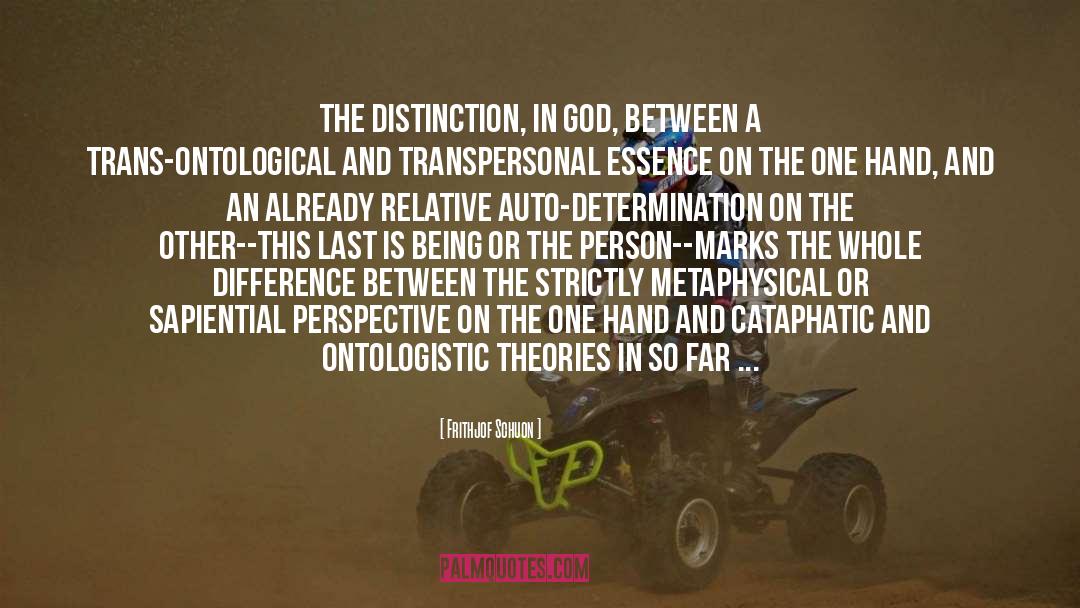
It is impossible to describe a landscape so validly as to exclude all other descriptions, for no one can see the landscape in all its aspects at the same time, and no single view can prevent the existence and validity of other equally possible views.
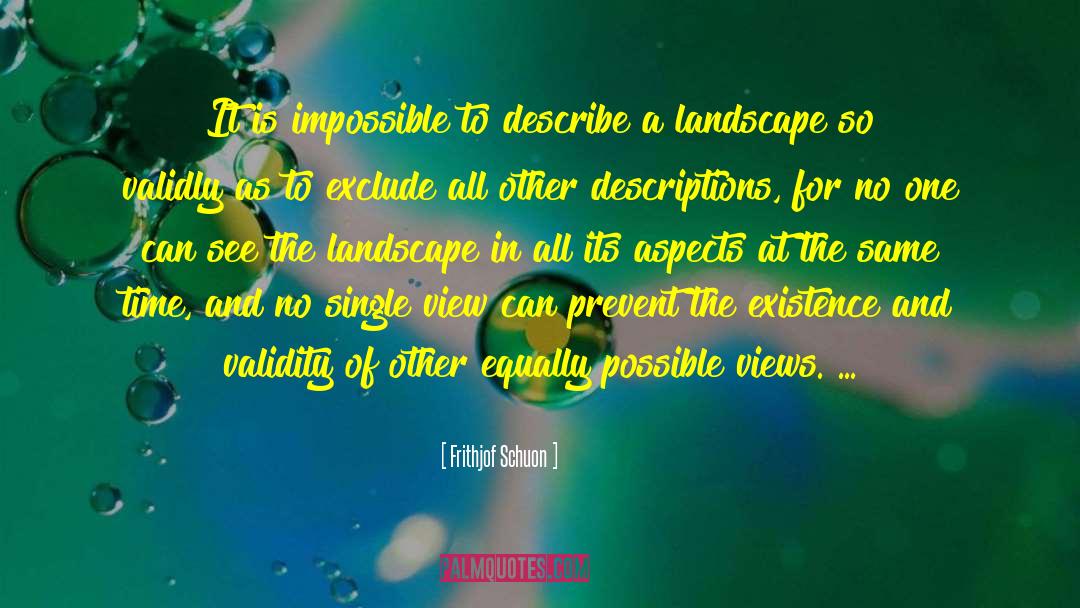
Blessed be the heart who finds its way to the eternal summer. [ ... to the realisation of eternal gratitude that things aren't worse, because they always can be!]
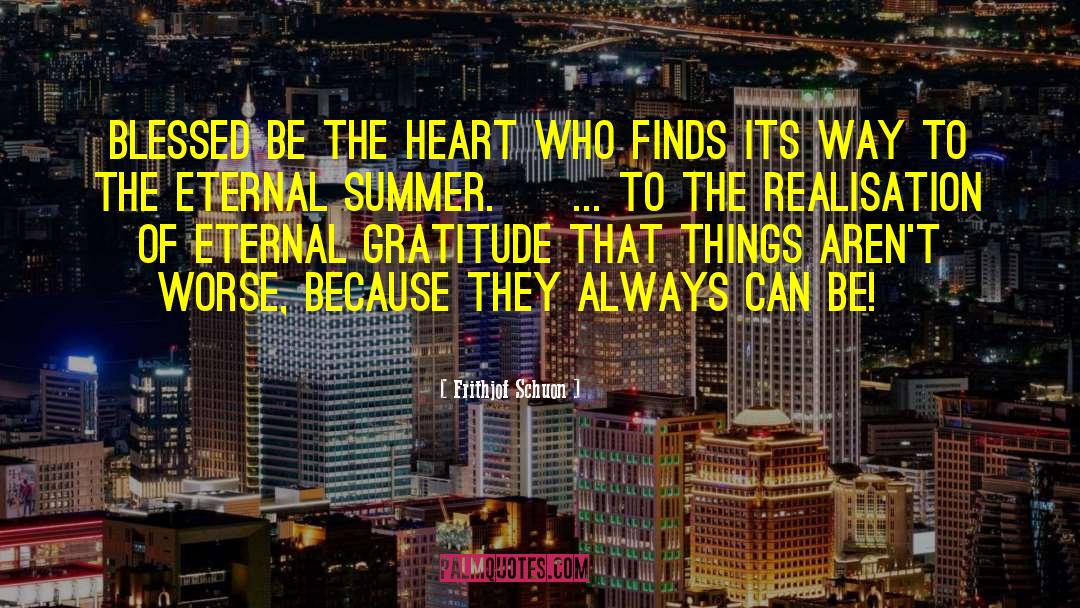
There is a false ecumenism, as sentimental and vague as you please, which for all intents and purposes abolishes doctrine; in order to reconcile two adversaries, one strangles them both, which is certainly the best way to make peace.
[...]
Objectivity toward the perspectives and spiritual ways of other peoples is too often the result of philosophic indifferentism or sentimental universalism, and in such a case there is no reason to pay it homage; indeed one may well ask whether objectivity in the full sense of the word is really involved. The Christian saint who fights Muslims is closer to Islamic sanctity than the philosopher who accepts everything and practices nothing.
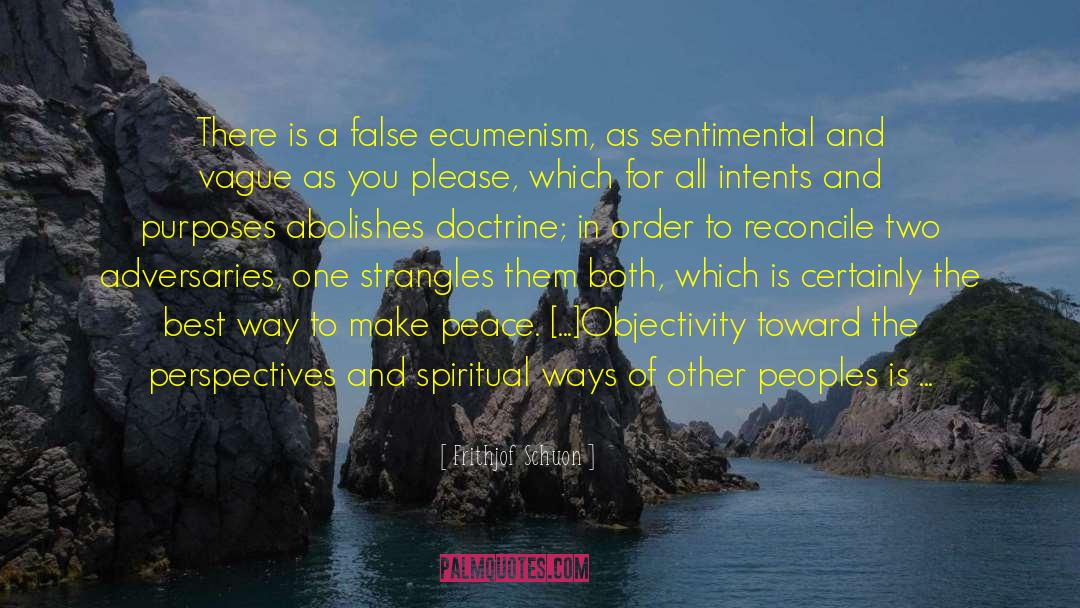
A civilization is integral and healthy to the extent [that] it is founded on the "invisible" or "underlying" religion, the religio perennis, that is, to the extent [that] its expressions or forms are transparent to the Non-Formal and tend toward the Origin, thus conveying the recollection of a lost Paradise, but also - and with all the more reason - the presentiment of a timeless Beatitude. For the Origin is at once within us and before us; time is but a spiral movement around a motionless Center.
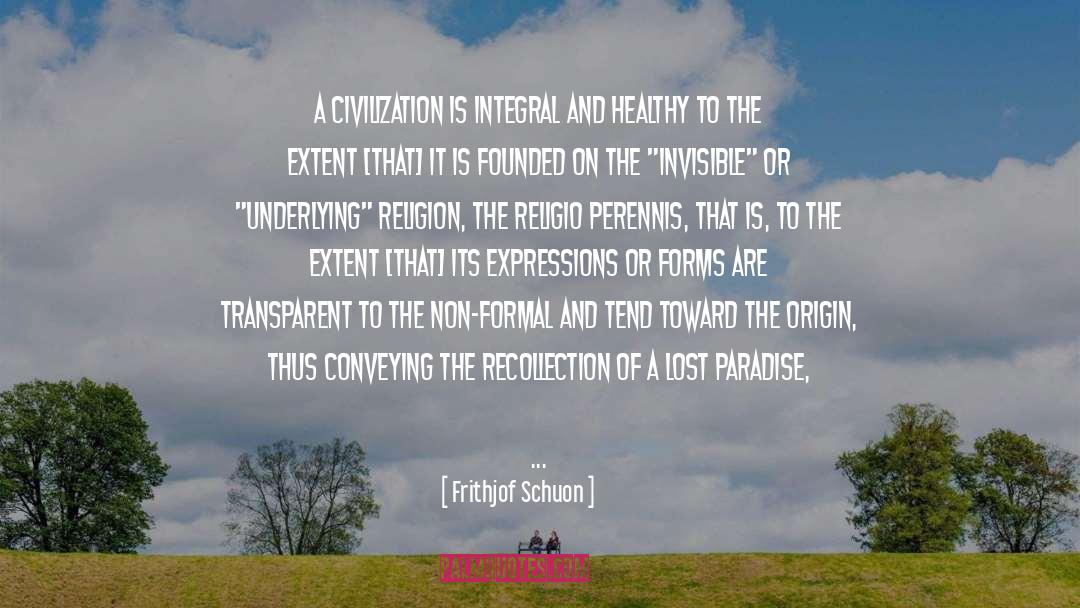
If Mohammed had been a false prophet. there is no reason why Christ should not have spoken of him as he spoke of Antichrist but if Mohammed is a true Prophet the passages referring to the Paraclete must inevitably concern him - not exclusively but eminently - for it is inconceivable that Christ, when speaking of the future, should have passed over in silence a manifestation of such magnitude. The same reasoning excludes a priori the possibility that Christ. when making his predictions, intended to include Mohammed under the general denomination of' false prophets", for in the history of our era Mohammed is in no sense a typical example among others of the same kind, but on the contrary, a unique and incomparable apparition(1). If he had been one of the false prophets announced by Christ he would have been followed by others and there would exist in our day a multitude of false religions subsequent to Christ and comparable in importance and extension to Islam. The spirituality to be found within Islam from its origins up to our days is an incontestable fact. and "by their fruits ye shall know them." Moreover, it will be recalled that the Prophet in his doctrine has testified to the second coming of Christ without attributing to himself any glory. unless it be that of being the last Prophet of the cycle and history proves that he spoke the truth, no comparable manifestation having followed after him.
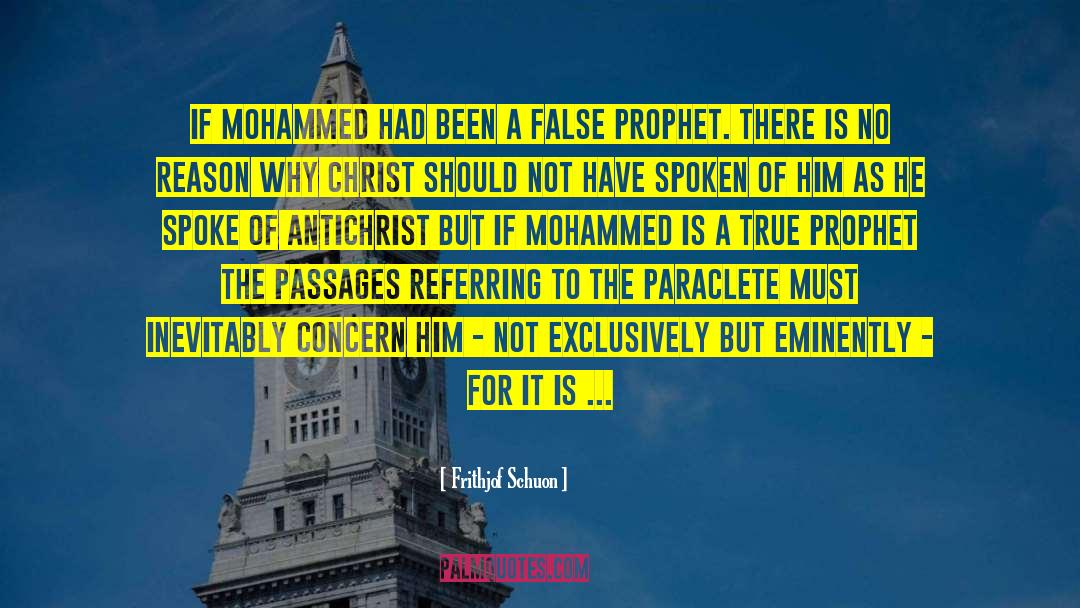
To summarize, the human mind is capable of making an essential distinction between the material or visible and the Immaterial or Invisible; or between the formal - matter, soul, spirits - and the angelic Non-formal, rooted in the Divine; or between the peripheral - extending from the physical cosmos to the angelic cosmos - and the Central, the manifested Spirit of God with its archangelic functions and metacosmic root; or between existence and Being, the created and the Creator, together with its Essence, which is Beyond-Being; or finally between Relativity - metacosmic as well as cosmic - and the Absolute as such. But there are also two non-distinctions, one from below and the other from above. For the first, everything is God, and we are therefore parts of God; this amounts to pantheism unless one compensates for this perspective by emphasizing its transcendent complement, as does shamanism but not philosophical pantheism. According to the second non-distinction, nothing is except Ātmā; this is the Vedantic thesis, which never excludes distinctions wherever these can and should apply; it is also the Sufic thesis, according to which the world is Allah as al-Zāhir, the Outward. The same teaching is likewise found in Mahāyāna Buddhism: Samsāra is Nirvāna, and Nirvāna is Samsāra; Existence is an aspect of Beyond-Existence, the supreme "Void", and it is for this reason that every consciousness contains in its substance a point of access to the "Void" or the Infinite, which is pu
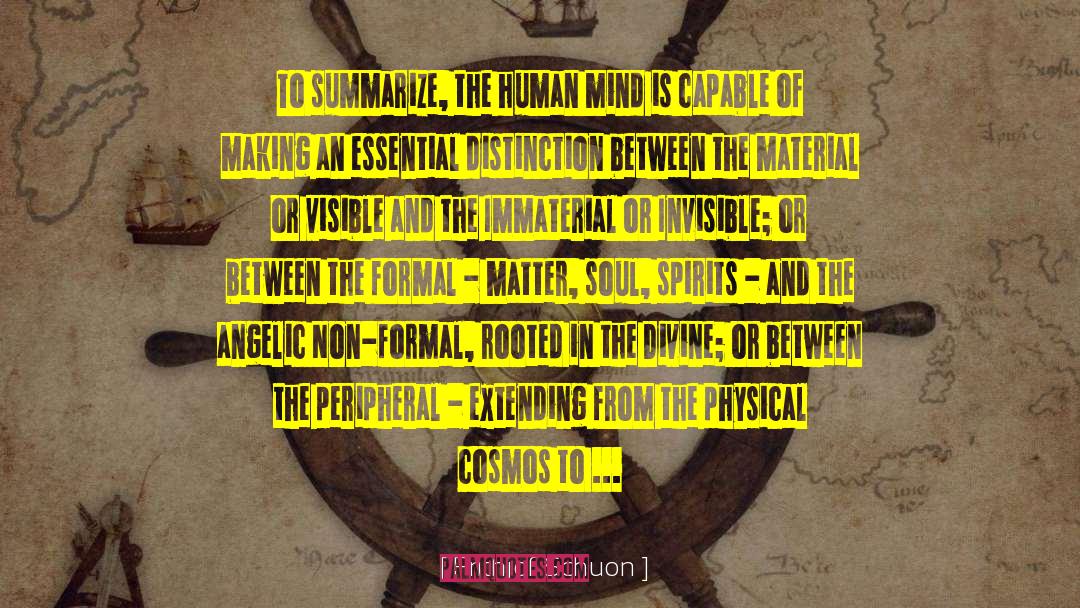
And this leads us to a further consideration: if there are different religions - each of them by definition speaking an absolute and hence exclusive language - this is because the difference between the religions corresponds exactly, by analogy, to the differences between human individuals. In other words, if the religions are true it is because each time it is God who has spoken, and if they are different, it is because God has spoken in different "languages" in conformity with the diversity of the receptacles. Finally, if they are absolute and exclusive, it is because in each of them God has said "I.
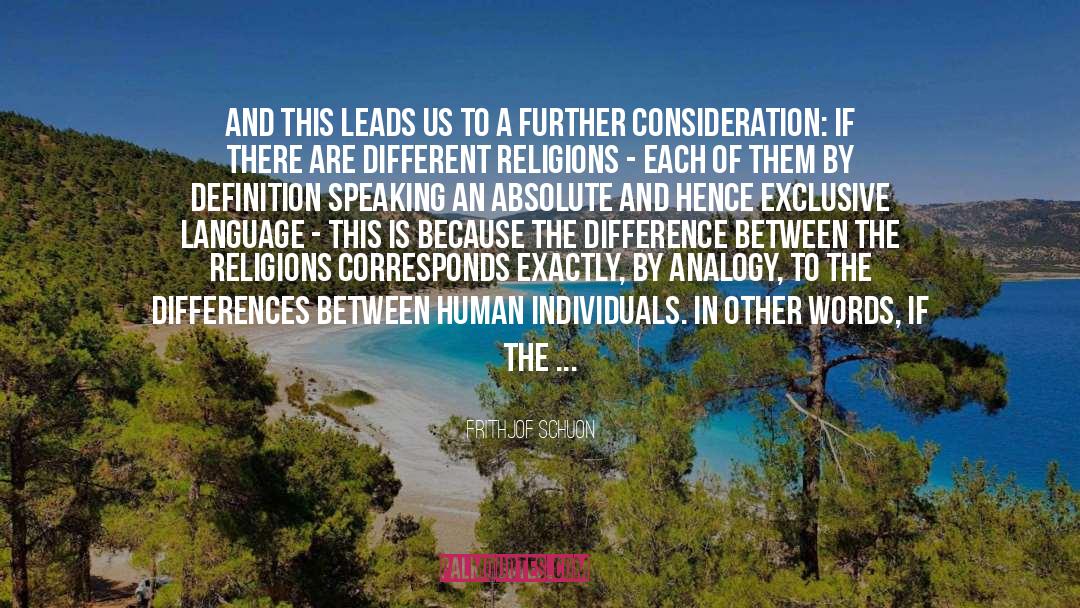
For primordial man Revelation and intellection coincided: contingency was still transparent so that there were as yet neither "points of view" nor "perspectives"; whereas in later times Revelation is multiple because geometrically speaking the circumference implies many radii, the "point of view" of primordial man corresponded to the entire circle; the center was everywhere. In the same way the unavoidably limiting aspect of expressions, forms, or symbols did not yet imprison minds; there was therefore no place for a diversity of forms, each expressing the same Truth in the name of the impersonal Self while excluding each other in the name of this or that particular manifestation of the personal God. Now that these diverse manifestations exist, what matters is knowing that intrinsically they speak in an absolute mode since it is the Absolute which is speaking, but that extrinsically they are clothed in the language of a particular mental coloring and a particular system of contingencies since they are addressed to man; now the man to whom they are addressed in this manner is already cut off from the inward Revelation that is direct and "supernaturally natural" intellection.
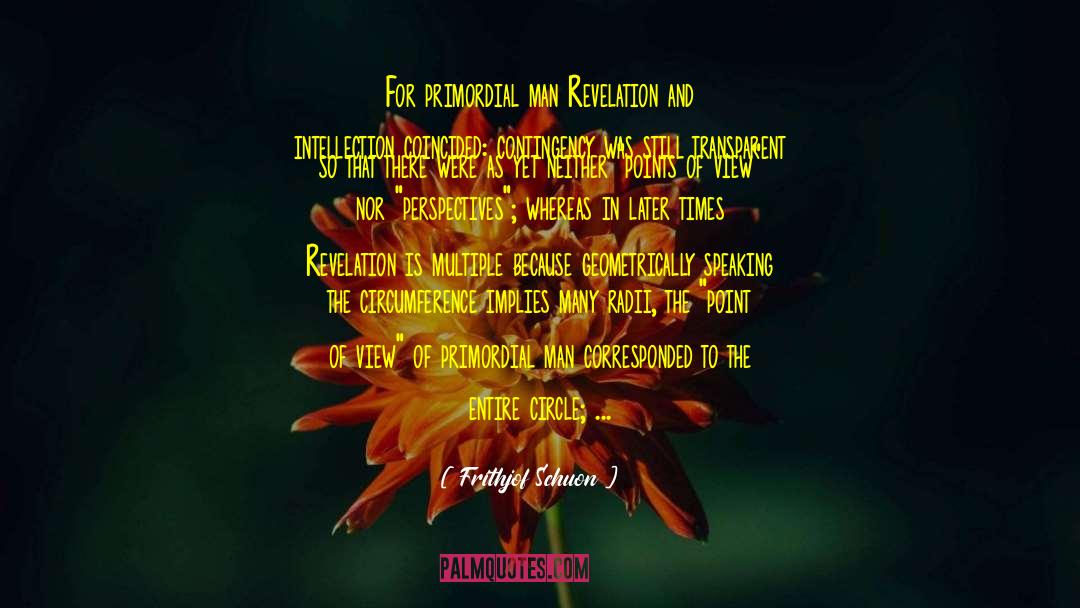
In our day everyone wants to appear intelligent, one would prefer to be accused of crime than of naiveté if the accompanying risks could be avoided. But since intelligence cannot be drawn from the void, subterfuge are resorted to, one of the most prevalent being the mania for "demystification", which allows an air of intelligence to be conveyed at small cost, for all one need do is assert that the normal response to a particular phenomenon is "prejudiced" and that it is high time it was cleared of the "legends" surrounding it; if the ocean could be made out to be a pond or the Himalayas a hill, it would be done. Certain writers find it impossible to be content with taking note of the fact that a particular thing or person has a particular character or destiny, as everyone had done before them; they must always begin by remarking that "it has too often been said", and go on to declare that the reality is something quite different and has at last been discovered, and that up till now all the world has been "living a lie". This strategy is applied above all to things that are evident and universally known, it would doubtless be too naive to acknowledge in so many words that a lion is a carnivore and that he is not quite safe to meet.
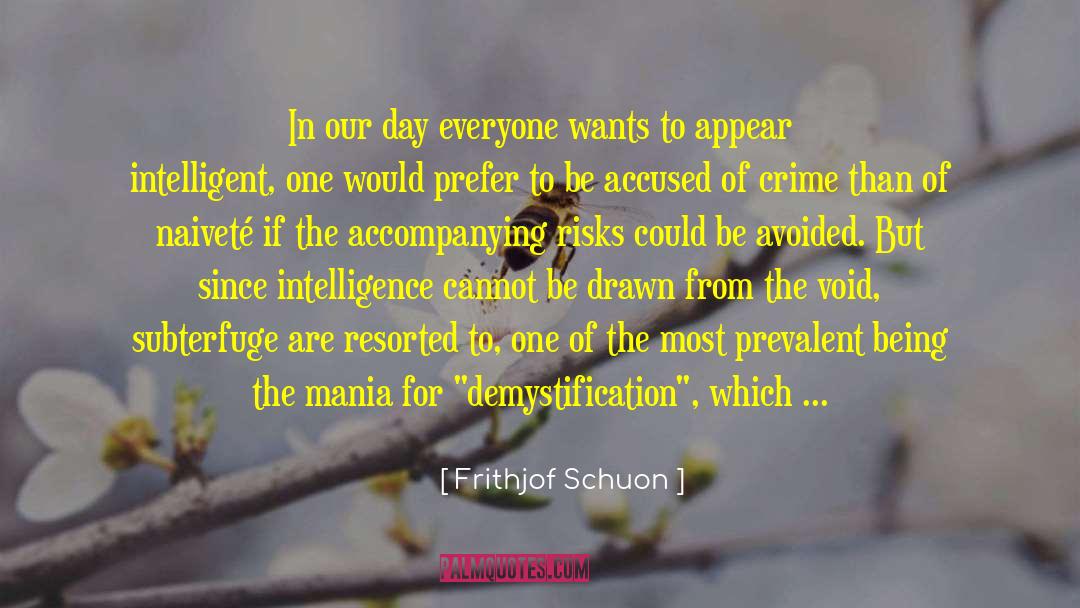
To believe with certain "neoyogists" that "evolution" will produce a superman "who will differ from man as much as man differs from the animal or the animal from the vegetable" is not to know what man is: it is one more example of a pseudo-wisdom that deems itself vastly superior to the "separatist" religions but in fact shows itself more ignorant than the most elementary catechism. For the most elementary catechism does know what man is: it knows that by his qualities, and as an autonomous world, he stands opposed to the other kingdoms of nature taken together; that in one particular respect--that of spiritual possibilities and not of animal nature--the difference between a monkey and a man is "infinitely" greater than that between a fly and a monkey. For man alone is able to leave the world; man alone is able to return to God; and this is the reason he cannot be surpassed by a new earthly being in any way. Man is central among the beings of the earth; this is an absolute position; there cannot be a center more central than the center if definitions have any meaning.
This neoyogism, like other similar movements, pretends that it can add an essential value to the wisdom of our ancestors; it believes the religions are partial truths that it is called upon to paste together after centuries or millennia of waiting and then to crown with its own naive little system.
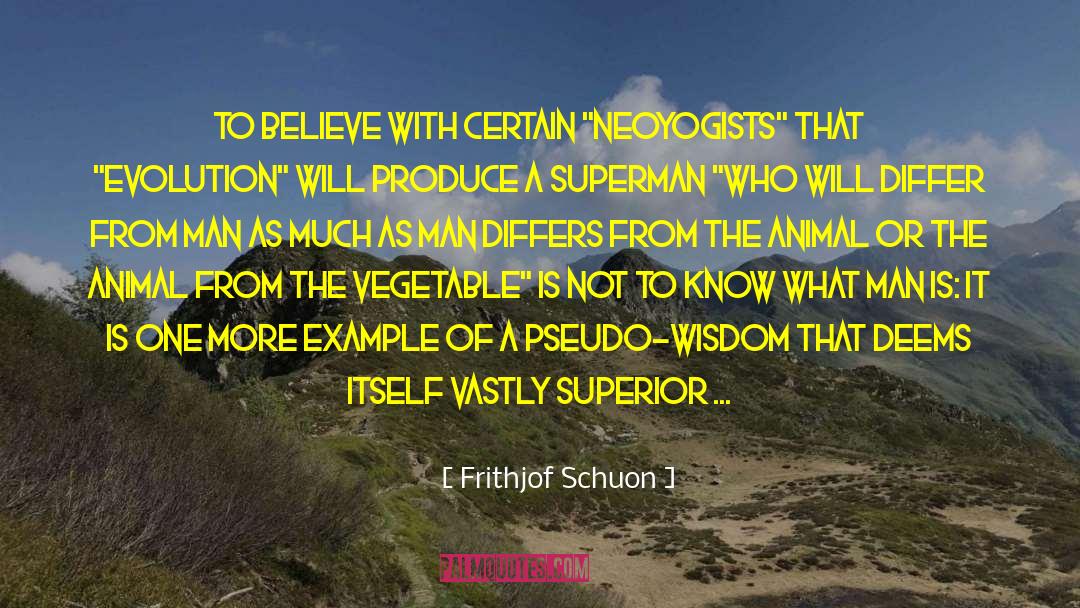
Spiritual realization is theoretically the easiest thing and in practice the most difficult thing there is. It is the easiest because it is enough to think of God. It is the most difficult because human nature is forgetfulness of God.
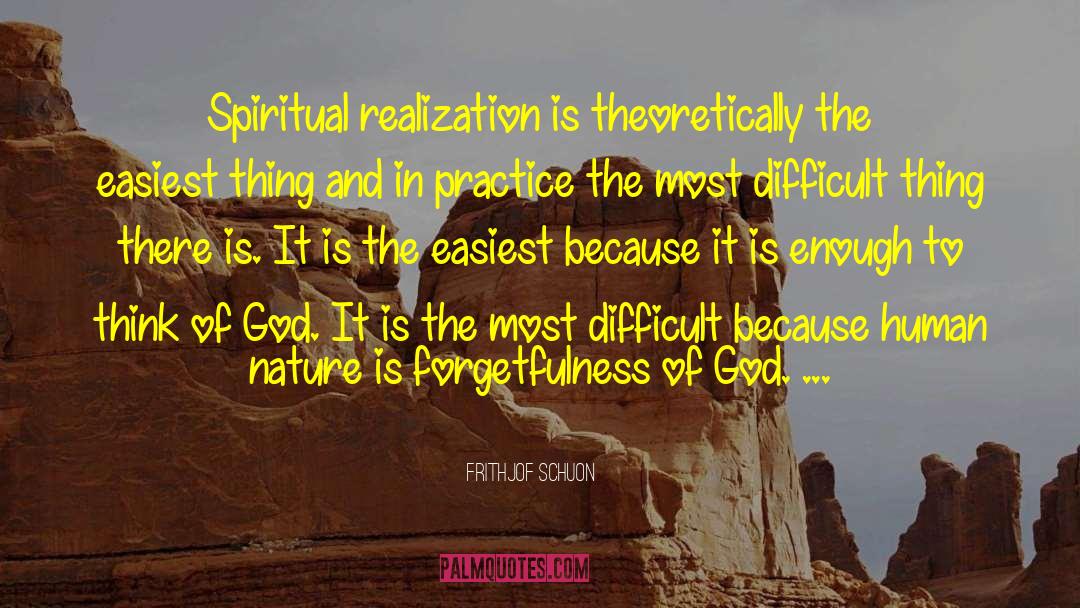
The existentialist will not ask, "What is this thing?" but "What does this thing signify for me?" Thus he will put the altogether subjective "significance" in place of the objective nature, which is not only the height of absurdity but also of pride and insolence. As true greatness " signifies" nothing for the little man, he will see in it only a kind of infirmity the better to be able to enjoy his own "significant" inflatedness.
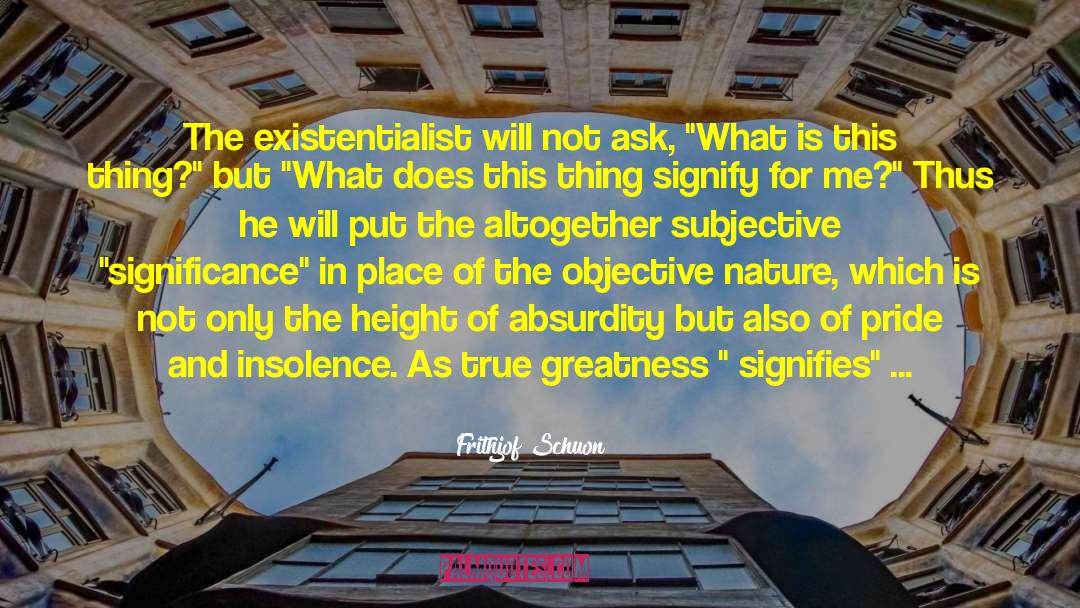
Many people of our time reason along the following lines: The religions - or the differing spiritual perspectives within a given religion - contradict one another, therefore they cannot all be right; consequently none is true. This is exactly as if one said: Every individual claims to be "I," thus they cannot all be right; consequently none is "I." This example shows up the absurdity of the antireligious argument, by recalling the real analogy between the inevitable external limitation of religious language and the no less inevitable limitation of the human ego. To reach this conclusion, as do the rationalists who use the above argument, amounts in practice to denying the diversity of the knowing subjects as also the diversity of aspects in the object to be known. It amounts to pretending that there are neither points of view nor aspects; that is to say, that there is but a single man to see a mountain and that the mountain has but a single side to be seen. The error of the subjectivist and relativist philosophers is a contrary one. According to them, the mountain would alter its nature according to whoever viewed it; at one time it might be a tree and at another a stream.
[No activity without Truth] - Studies in Comparative Religion, Vol. 3, No. 4. (Autumn 1969)
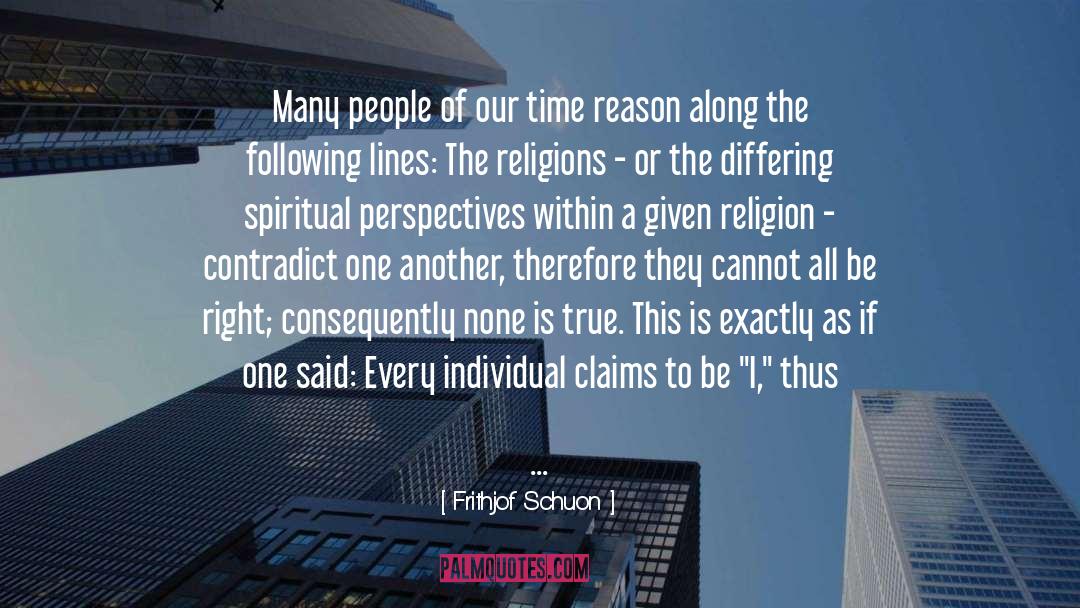
Such was also the case with Nietzsche, a volcanic genius if ever there was one. Here, too, there is passionate exteriorization of an inward fire, but in a manner that is both deviated and demented; we have in mind here, not the Nietzschian philosophy, which taken literally is without interest, but his poetical work, whose most intense expression is in part his 'Zarathustra'. What this highly uneven book manifests above all is the violent reaction of an a priori profound soul against a mediocre and paralyzing cultural environment; Nietzsche's fault was to have only a sense of grandeur in the absence of all intellectual discernment. 'Zarathustra' is basically the cry of a grandeur trodden underfoot, whence comes the heart-rending authenticity – grandeur precisely – of certain passages; not all of them, to be sure, and above all not those which express a half-Machiavellian, half-Darwinian philosophy, or minor literary cleverness. Be that as it may, Nietzsche's misfortune, like that of other men of genius, such as Napoleon, was to be born after the Renaissance and not before it; which indicates evidently an aspect of their nature, for there is no such thing as chance.

This capacity for objectivity and absoluteness amounts to an existential - and "preventive" - refutation of the ideologies of doubt: if a man is able to doubt, it is because there is certainty; likewise the very notion of illusion proves that man has access to reality. It follows that there are necessarily some men who know reality and who therefore have certainty; and the great spokesmen of this knowledge and certainty are necessarily the best of men. For if truth were on the side of doubt, the individual who doubted would be superior not only to these spokesmen, who have not doubted, but also to the majority of normal men across the millennia of human existence. If doubt conformed to the real, human intelligence would be deprived of its sufficient reason, and man would be less than an animal, for the intelligence of animals does not doubt the reality to which it is proportioned.
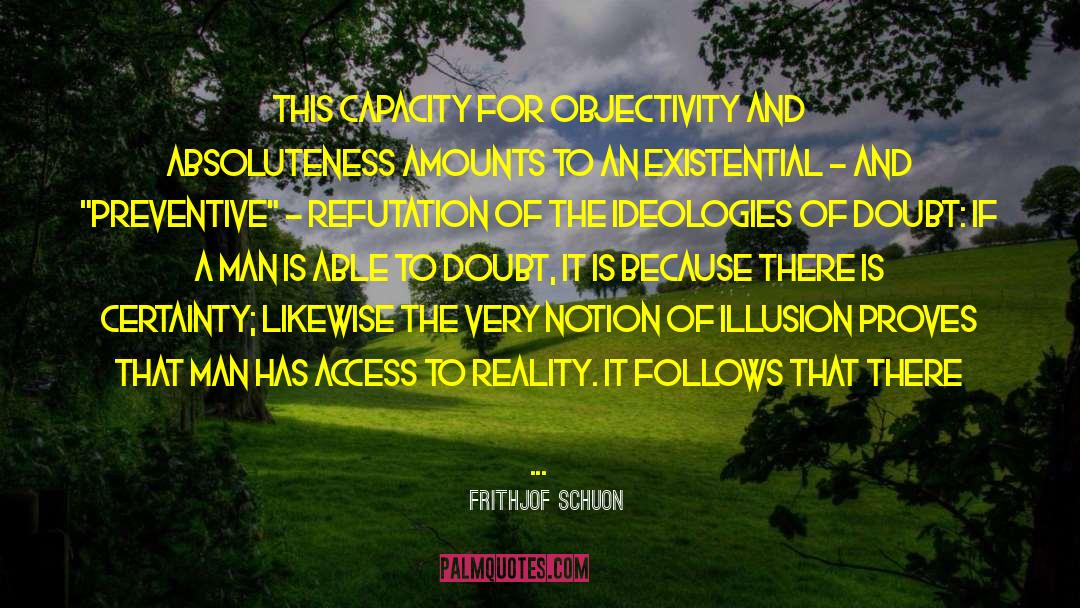
That which is lacking in the present world is a profound knowledge of the nature of things.
